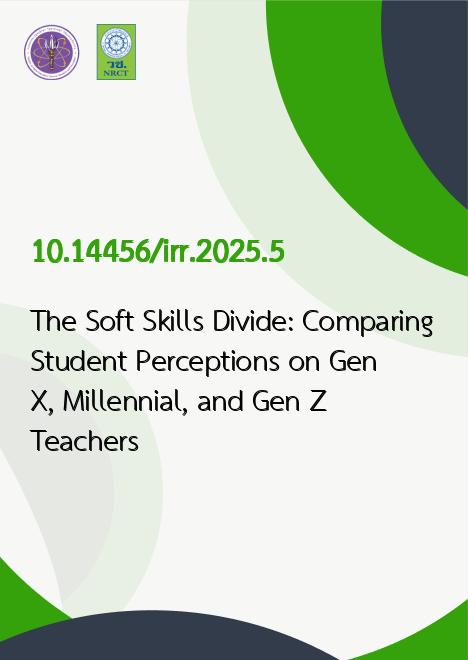
|
The Soft Skills Divide: Comparing Student Perceptions on Gen X, Millennial, and Gen Z Teachers |
|---|---|
| รหัสดีโอไอ | |
| Creator | Ameer Benjamin B. Calderon |
| Title | The Soft Skills Divide: Comparing Student Perceptions on Gen X, Millennial, and Gen Z Teachers |
| Publisher | Phetchaburi Rajabhat University |
| Publication Year | 2568 |
| Journal Title | Interdisciplinary Research Review (IRR) |
| Journal Vol. | 20 |
| Journal No. | 2 |
| Page no. | 1–10 |
| Keyword | Teacher Soft Skills, Teacher Generation, Student Perceptions |
| URL Website | https://ph02.tci-thaijo.org/index.php/jtir |
| Website title | Interdisciplinary Research Review (IRR) |
| ISSN | 2697-536X |
| Abstract | Today’s teachers come from different generations, leading to varied student perceptions depending on their teachers’ generational background. This study explores how students perceive the soft skills—communication, empathy, adaptability, and leadership—of Generation X, Millennial, and Generation Z teachers. Addressing a gap in comparative research, the study employed a multicase qualitative design involving two teachers from each generation and their respective students, selected based on teaching experience and exposure. Focus group discussions were conducted with 36 students to capture insights, and data were analyzed using the KJ Method to identify recurring themes and cross-generational patterns. Findings reveal distinct generational characteristics in the manifestation of soft skills. Generation X teachers were perceived as clear and structured communicators who emphasize discipline, demonstrate care through high expectations, and lead with authority and mentorship. Millennial teachers were described as collaborative and emotionally supportive, balancing flexibility and structure while promoting shared leadership. Generation Z teachers were viewed as relatable, digitally fluent, quick to adapt to student needs, and motivational leaders who lead by example. These perceptions show that while each generation demonstrates valuable strengths, no single approach fully meets all student expectations. Thus, teachers must adapt their methods by blending traditional and modern practices. The study underscores the importance of continuous, generation-responsive professional development to enhance soft skills and optimize classroom engagement. |